English Words in Action, Group B
(a variety of English words which have developed through history and are currently used in our modern age)
Simply click on this banner (or the following link) and you will be on your way to stimulate your brain for greater word comprehension with quizzes based on some of the words in this unit.
2. Mental acceptance of and conviction in the truth, actuality, or validity of something: It is Harvey's belief that it will rain in the evening because he could see dark clouds overhead.
3. Something that is accepted as true; especially, a particular tenet or a body of tenets or teachings that are accepted by a group of people: The beliefs of the union members are stated in the contract and bylaws.
4. A statement, principle, or doctrine that a person or group accepts as true; such as, religious principles: Nena's strong religious beliefs have been challenged by something that she read about some religious leaders in the newspaper.
5. Etymology: before 1400 belyefe, before 1225, it was bileve and probably before 1200, it is assumed to have been bileave.
The Old English geleafa is descended from the same language or form of Old Saxon gilobo, "belief", Old High German giloubo (modern German Glaube), and Gothic galaubeins, "belief" and galaubjan, "to believe".
2. To have confidence or faith in the truth of something; to give credence to: Chuck believed that the story in the newspaper was true and honest.
3. To have confidence in the assertions or statements of a person: Ashton believes that her friend will still trust her when she tells him what really caused the accident when she borrowed his car.
4. To have a conviction that a person or thing is, has been, or will be engaged in a given action or involved in a given situation: Thomas believes that his horse will be the winner in the upcoming steeplechase race.
5. To be persuaded of the truth or existence of something: There is much to be said for the old adage, "seeing is believing".
6. To have faith in the reliability, honesty, benevolence, etc., of someone or something: Joleen's friend truly believes that he was right in deciding to go on holidays in December.
2. People who accept the truth of the scriptures of their religious faith: During the interfaith service in the park, many believers gathered to celebrate their friendships.
3. A person who accepts something as true or real: Bill, are you actually a believer of the story that was written in the news today?
4. Someone who accepts the veracity or truth of a situation: Mildred was doubtful that she could run her own company, but she has made a believer out of her husband.
5. A person who thinks or expects something to happen: Elaina is a believer that her sister will really arrive the day she promised.
2. A male sheep that leads the flock: The bellwether, or head ram, has a bell around its neck to be heard by the sheepherder in the field.
3. A person who assumes leadership of a movement or an activity: Mrs. High is now the bellwether of fashion for women this year.
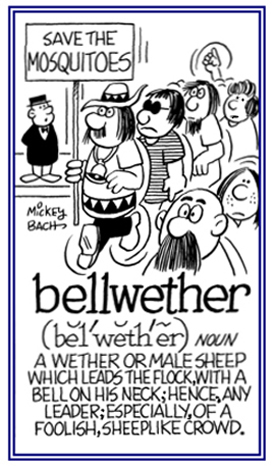
Go to this Word A Day Revisited Index
so you can see more of Mickey Bach's cartoons.
2. A shallow dive in which the front of the diver's body hits the water first: The children, supervised by the adults, were playing at the pool and did belly flops into the water, laughing hysterically all the time.
2. Related to being overtaken by night or darkness: It was pitch black outside and the benighted travelers were hurrying home as quickly as possible.
3. A reference to an absence or deficiency of enlightenment or knowledge of culture: The students in the history class read about the benighted times of barbarism and superstitions.
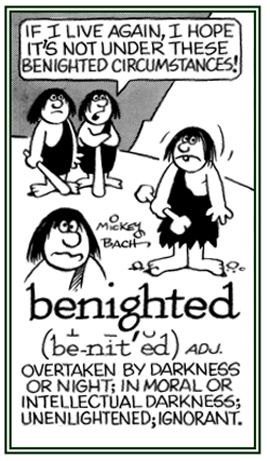

Go to this Word A Day Revisited Index
so you can see more of Mickey Bach's cartoons.
Harry was told that since his son has a bent for music, make sure he learns to play a musical instrument.
2. A relatively permanent inclination to react in a particular way: The politician had a bent for ignoring people who asked him negative questions about his time as a senator.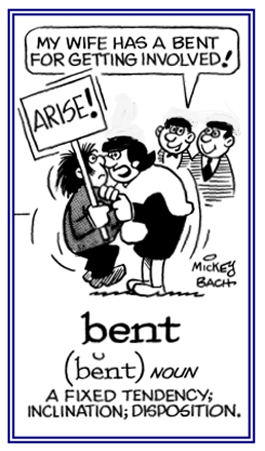
Go to this Word A Day Revisited Index
so you can see more of Mickey Bach's cartoons.
The supervisor lost control when he was berating his construction crew for the collapse of the building they were working on.
Disapproval, criticism, chiding, and scolding are involved when berating anyone because it is considered to be extremely strong and involves vilification and harsh abuse.
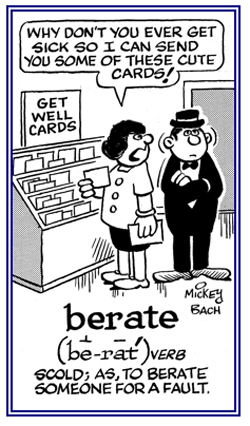

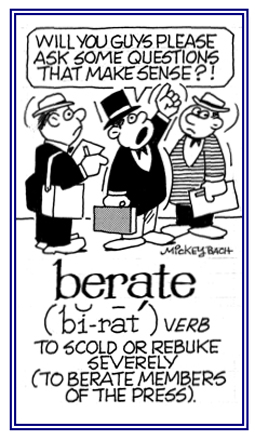
Go to this Word A Day Revisited Index
so you can see more of Mickey Bach's cartoons.
The campers near the swamp were beset by hundreds of mosquitoes.
2. To trouble persistently; to harass: The congressman was beset by questions from reporters who wanted to know why he didn't vote for the new health bill.3. To hem in; to surround: The mountains beset the village where Jim and his family were living.
The actor was beset by a crowd of admirers.
4. To assemble, to decorate, or to cover lavishly with jewels: The queen's crown was beset with rubies, emeralds and pearls.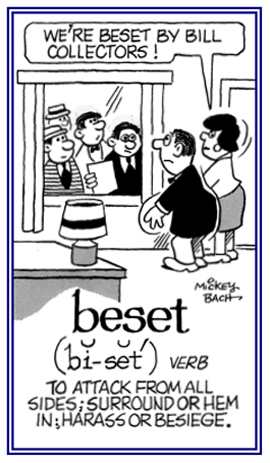
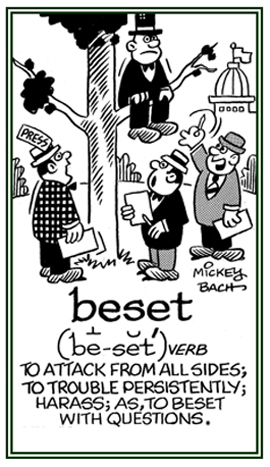
Go to this Word A Day Revisited Index
so you can see more of Mickey Bach's cartoons.
2. Etymology: from the late 17th century, be-, "thoroughly" + archaic or obsolete wilder, "to lead astray, to lure into the wilds" of unknown origin.
2. Etymology: first recorded in the 1680's, bewilderment is a combination of be, "thoroughly" + wilder, "to lead astray" or "to lure into the wilderness" + ment, "state, condition", or "quality".
George's children are constantly bickering over their toys.
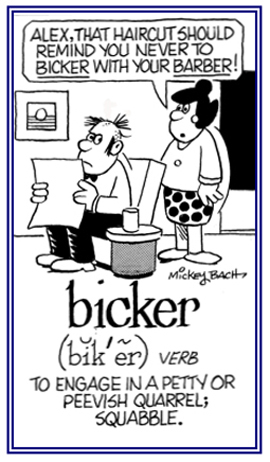
Go to this Word A Day Revisited Index
so you can see more of Mickey Bach's cartoons.
Links to all of the groups of English words in action, Groups A to Z.
You may see the bibliographic list of sources of information for these words in action.


